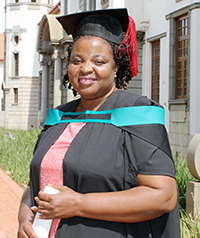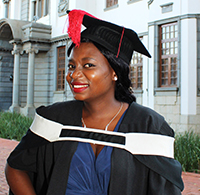
Glory, one of fourteen NSH bursary recipients during the UFS Autumn Graduations. |
At the University of the Free State (UFS) Autumn Graduation Ceremony held from 12-15 April 2016, on the Bloemfontein Campus, a record number of fourteen beneficiaries of the No Student Hungry (NSH) Bursary Programme received their degrees. This is an achievement they all feel they could not have reached, were it not for the support by NSH.
The NSH food bursary is awarded to students on the basis of financial need, academic excellence, and a commitment to serve the community. The UFS has helped over 650 students since 2011, when Prof Jonathan Jansen, Vice-Chancellor and Rector, started NSH.
These students are true beacons of inspiration and determination. Indeed, they have triumphed in the face of adversity. This is what can be said about their determination and will to succeed.
Glory, a previous recipient of the NSH bursary and a mother of two, graduated on Tuesday morning, receiving a BEd degree (intermediate phase). She stated that the NSH bursary changed her life drastically when she started receiving it.
“I used to constantly worry about my children and what they would eat. So I would sacrifice my own meals throughout the day just to make sure they have food to eat,” says Glory.
“The NSH bursary really gave me peace of mind, my school work was suffering and once I started receiving food each day, I could focus on what really mattered: my degree.”
“My goals for this year are to get a permanent job, and start receiving a stable salary. I am currently working as a temporary teacher at a primary school in Bloemfontein.

Katlego, one of fourteen NSH bursary recipients during the UFS Autumn Graduations. |
“I never would have thought that I could have made it this far. I want to pursue my postgraduate studies, to inspire my children and other students who have been in my shoes. There is help and hope. My faith also gave me refuge. Nothing that is given to me is taken for granted,” says Glory.
Another student Katlego, who graduated on 14 April 2016, receiving her BCom Human Resource Management degree. At present, she is busy with her BCom Industrial Psychology Honours. She heard about the NSH food bursary, through a friend in 2014, and has been immensely grateful for all she has received.
“There is no shame in asking for help. There can only be hope and relief,” she said.
“I am so thankful for NSH. As part of the bursary programme, we commit to serving the community. We receive but we are also encouraged to give back. The community service projects have helped me to get out of my comfort zone, to look beyond myself and acknowledge that I am also required to give back my time to others who appreciate and cherish it.”
The NSH students are offered not only a food bursary; they participate in student wellness and development programmes, and they are motivated and exposed to opportunities for personal growth. Students are also encouraged to be involved in university or community projects as a way of ploughing back into the community, thus creating a reciprocal cycle of giving and receiving within their community.